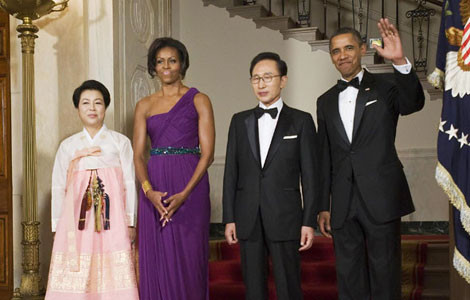British IT firm joins the scramble for China’s luxury market
Updated: 2011-10-14 20:04
By Cecily Liu and Zhang Chunyan (chinadaily.com.cn)
|
|||||||||||
London – A British company is planning to launch a Chinese language web portal to target Chinese consumers as China's rich are eyeing Western luxury goods.
Chinese consumers will soon be able to pay renminbi for luxury goods delivered directly from their manufacturers in the West through MydiMyMy, a portal to be opened on Nov 28.
The shopping website is developed by the UK company Backbone IT Group.
"Ecommerce will create a cost-effective channel for Western luxury brands without a China presence to tap into China’s growing middle class consumers," Richard Unwin, a director of Backbone IT, told China Daily in an exclusive interview.
"Many Western luxury brands have opened stores in China's coastal cities only, but MydiMyMy's door to door service will capture demand from right across the country," Unwin added.
MydiMyMy represents the latest move for Western companies to attract Chinese consumers through technological innovation.
China's consumption of luxury goods totalled $ 9.4 billion by the end of 2009, accounting for 27.5% of global luxury goods sales, according to statistics from the World Luxury Association. China has surpassed the United States to become the world's second largest consumer of luxury goods, and is poised to become the world’s largest by 2015, according to a survey by Boston Consulting Group in 2010.
David Roth, CEO of WPP The Store Global Retail Practice, said, "MydiMyMy is an interesting development and an example of how Western economies realise that they need to engage with consumers in China."
Products to be sold on MydiMyMy include clothing, jewelry, handbags, cosmetics and other accessories, with about 20 vendors from countries like the UK, Italy and North America.
Chinese consumers will be able to browse information about brands and products in Chinese on MydiMyMy. Western vendors will each have an account on the portal’s English language administrative website, allowing them to update information about products.
Unwin revealed that the portal’s payments will be made through Ali Pay, China's largest online payment provider, also the leading third-party online payment solution, providing an easy, safe and secure way for millions of individuals and businesses.
Ali Pay has confirmed its contract with Backbone IT, but said that it is also keen to explore future partnerships with similar web portals developed overseas.
Backbone IT, which has 20 employees between the UK and China, opened an office in Nanjing, Jiangsu Province in 2004. Unwin said that the launch of MydiMyMy will "significantly" increase its employee numbers in China.
Unwin said that the website’s carrier partners are DHL, TNT and Fedex. They will take the products straight from the manufacturers to Chinese customers.
"We have negotiated excellent deals with our carrier partners. This enables us to pay freight costs significantly lower than individuals or small businesses that currently provide the same service," Unwin said.
Unwin noted that the prices of products sold to Chinese consumers will be set by individual manufacturers, and confirmed that the same import duty applies.
"The delivery, interface, return of products, local marketing, taking of payments and other customer services will be run by our China office. We expect the portal to have a soft launch, but it may not be long before our sales volumes significantly increase," Unwin said.
Unwin put it, "We have a 10 day return and refund policy. If customers decide that they do not like the products, they only need to pay to send the items to our Nanjing office. The returns will be at our expense if the products are faulty."
Tristan Rogers, chief executive of UK-based Concrete Group, a consultancy, said that the model "could work".
Emerging markets' high demand for Western luxury products have pushed up the premium of some products sold in franchise stores of these countries, but competition created by international ecommerce may eventually reverse this trend.
"If ecommerce brings the price of goods sold in emerging markets closer to the international average, then Chinese consumers may eventually decide not to go to a store again no matter how much they like that particular store," Rogers said.
"International ecommerce will also provide opportunities for smaller brands which cannot expand abroad as quickly, creating a more level playing field," Rogers added.
However, Charles Fallon, co-founder of S.I.Partners, a consultancy, said that he is not too optimistic about MydiMyMy.
"Shopping is full of emotions. The experience is very important for Chinese consumers, therefore luxury brands should focus on getting customer service right all the way," Fallon said.
S.I.Partners works closely with many luxury brands that expand into China, some of which provide an ecommerce service, while others choose not to.
Fallon said these brands of vendors partnered up with MydiMyMy may have difficulty competing with luxury names with a China presence already.
"These brands are mostly second tier luxury. Most of the top tier luxury brands have already established themselves in second tier Chinese cities."
Roth also noted, "The challenge will not be logistics, or payment, but how to spread awareness that these brands will bring the values and prestige desired by Chinese consumers."
"The portal cannot achieve brand awareness, it simply makes transactions easier," said Roth.
"It is much more difficult for brands to be seen as having quality and status if consumers have never heard of them. If ecommerce works well, LV could have entered China this way, but would never achieve the success it has today," Roth added.
Hot Topics
Libya conflict, Gaddafi, Oil spill, Palace Museum scandal, Inflation, Japan's new PM, Trapped miners, Mooncake tax, Weekly photos, Hurricane Irene
Editor's Picks

|

|

|

|

|

|







